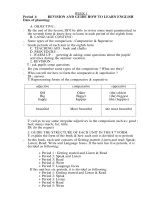How to speak english fluently tips and tricks for english learners
Bạn đang xem bản rút gọn của tài liệu. Xem và tải ngay bản đầy đủ của tài liệu tại đây (290.47 KB, 129 trang )
How to Speak English
Fluently
Tips and Tricks for
English Learners
Janet Gerber
How to Speak English Fluently Copyright © 2014 by
Janet Gerber
All rights reserved. No part of this book can be reproduced
in any form without permission in writing from the author.
Reviewers may quote a brief passage in their review.
Disclaimer
No part of this book can be reproduced or transmitted in
any form or by any means, electronic or mechanical, including photocopying and recording or by any information storage or retrieval system or by email without written permission from publisher.
While all attempts have been made to verify the information
provided in this book, neither the author nor the publisher
assumes any responsibility for errors, omissions, or different interpretations of the subject matter herein.
Neither the author nor the publisher assumes any responsibility or liability on behalf of the reader of this book.
This book is for entertainment purposed only. The views expressed are those of the author alone and should not be
taken as expert instruction or commands. The reader is responsible for his or her own actions in regards to the information in this book.
Any perceived slight of any individual or organization is not
intentional.
A Free Gift for
You!
As a way of saying ‘Thanks!’ for your purchase, I’m offering a free 5-Day e-course that
is exclusive to my book and blog readers.
The free 5-Day e-course is on speaking and
understanding English better. In this ecourse you will learn a variety of ways to help
you improve your English speaking and
comprehension.
This 5-Day e-course is in video format and
you can access the 5-Day e-course by going
here.
/>808743734.htm
Table of Contents:
Chapter 1: Introduction
Chapter 2: Five Limiting Beliefs about
Learning English
Chapter 3: Your Mindset
Chapter 4: Goals
Chapter 5: Reevaluate How You Are Learning English
Chapter 6: Language as a Tool Not a Science
Chapter 7: Improve Your Speaking
Chapter 8: Improve Your Listening
Chapter 9: Improve Your Reading
6/129
Chapter 10: Improve Your Writing
Chapter 11: Immerse Yourself in English
Chapter 12: Achieving English Fluency
Chapter 13: Learning English Fluently Will
Change Your Life
Chapter 14: Take Action Today
One Last Thing…
Chapter 1:
Introduction
Have you been learning English for a long
time but still struggle to understand native
English speakers? Have you been taking
English classes for years but do not see much
progress in your English speaking abilities?
Do you get nervous and make mistakes when
you have to speak English with other people?
Do you get confused and overwhelmed when
listening to people talk in English?
This book was
designed to teach
you:
• How to make specific goals related to
your English learning.
• Tips to improve your speaking,
listening, reading and writing skills
in English.
• What resources are available to help
you learn English in your own time.
It is frustrating to be studying English and
not see results. You deserve to learn why you
may not be seeing results and what you can
do to see your English language skills
improve.
9/129
There are so many classes, teachers, books
and websites that try to give you advice that
is “the best way to learn English” In this
book you will learn that only you know the
best way you learn.
In this book, I will provide you with many
different ideas, tips and resources that you
will find helpful and will be able to use and
try right away.
Why do you want to
speak English
fluently?
Each person has a different reason as to why
they want to speak English fluently or proficiently. Some many want a better job and
others may want to travel or make new
friends. No matter what your reason for
learning to speak English is, you need to
commit to learning English.
There is no magic formula or method to
make you learn English in a day. You need to
set a goal and stick to how you plan to improve your English language skills.
Since each person has different goals, some
of the methods in this book will not work for
11/129
you while others will. The most important
thing is that you try. Not that you try once in
a while to improve your English but that you
commit to 10, 15 or 30 minutes a day to improving your English.
This book is very practical and highly actionable. You will find many links and ideas
within that will help you find a way that
helps you improve your English. My goal is
to help you speak better English by giving
you different tips, tricks, resources and
ideas.
Who Am I?
My name is Janet Gerber. I run the website
English
Tonight
(). I am a teacher and language
learner. On my website and in this book, it is
my goal to give you practical advice, tips and
activities that allow you to improve your
English.
One thing that challenged me when I was
trying to learn my second language was finding information, techniques and activities to
help me improve. I spent a lot of time surfing
the internet and finding resources. There
were so many and at times I would get overwhelmed and not know which way was the
“best way” to learn a new language.
Chapter 2: Five
Limiting Beliefs
about Learning
English
Many people have beliefs that limit their language learning. It hinders their learning because they think they can’t learn English because of the belief or thought that they keep
telling themselves over and over again.
Below you will read about five common limiting beliefs that students that are learning
(or want to learn) English have.
Many people say…
1. I’m too old to learn English.
You are never too old to learn something
new. It is not true that there is an age limit
for learning a new language. It may however,
be more difficult as time goes on but you’re
up for a challenge, right? Instead of making
up excuses of what you aren’t learning, keep
track of what you know or have learned. You
could try to learn one new word a day, write
a paragraph a day or spend 10 minutes focusing on English. If you take small steps to
learning English; you will learn. Make a list
of words you know or just learned. Don’t get
stuck on what you don’t know. The more
positive you are about your learning and
English language acquisition, the better it
will stick in your mind.
15/129
2. I can’t speak English proficiently
without traveling.
This is not true. I have met a lot (like thousands) of people that speak proficient English and they have never traveled to any English speaking country. They speak and understand English. You too can learn English
without jetting off to New York, Sydney or
London. Instead of focusing on what you
can’t do right now, focus on what you can.
You can learn English where you live if you
have access to a computer and are determined. There are plenty of free resources, websites and classes on the internet that can help
teach you English.
3. I have no one to speak English with.
That’s ok! You can learn to speak English no
matter where you live in the world as long as
you have access to a computer. It doesn’t
matter if you live in a remote village in the
16/129
mountains of India or in the jungle in the
middle of South America. You can find other
English learners, just like you online that
want to learn English and would love to
practice speaking with you. Many people are
in the same situation as you are. There are
many language exchange and language
learning websites that will connect you to
someone that wants to practice English or
that wants to learn your native language.
With the advances in technology, you can literally learn to speak English without ever
leaving your home.
4. I can’t remember all of the English
grammar rules.
No one can remember all the grammar rules.
Learning a new language is not about learning rules, it is about learning words that allow you to communicate with other people.
Your grammar does not need to be perfect or
even near perfect to be understood and start
17/129
communicating. Native English speakers do
not know all (or often times a lot) of grammar rules and make many grammar mistakes. They don’t care. I assume that since
you are reading this book you want to learn
to speak English fluently. Focus on speaking
and listening not on being the English grammar police.
Let’s pretend your grammar isn’t great but
you try speaking anyway. You could say ‘I
yesterday banana eat.’ And I as a native
speaker might say back to you, ‘Oh, you
mean… you ate a banana yesterday?’ At that
point, if you were paying attention you would
have heard what you were trying to say,
stated correctly and could rephrase (or
resay) what you heard. ‘Yes, I ate a banana
yesterday.’ Just like that, you were able to
communicate with someone while making
grammar mistakes and learn the correct way
to say something…. without studying a grammar book or rules about past tense. You can
18/129
drastically improve your English grammar
by practicing speaking.
Stop wasting your time memorizing verb
tenses and grammar rules. This will not help
you become a better English speaker. It instead will make you insecure about speaking
because you are thinking about rules instead
of thinking about talking and communicating with a new person.
5. I’m afraid to make mistakes.
Mistakes are good; no…EXCELLENT! The
more mistakes you make the faster and more
you will learn. Everyone makes mistakes all
the time. You should try not to get hung up
on feeling bad about making mistakes.
In my class, I had two very different students. One never said anything and if I
forced her to speak she would look really
nervous and whisper her answer. She was
19/129
obviously terrified that something bad could
happen from her mistakes.
Another student that was in the same
classroom talked a lot (sometimes too
much). His English was far from perfect but
he kept trying. He made a lot of mistakes but
everyday kept trying his best and approached
learning English as a positive and fun thing.
He liked that he could communicate and talk
to more people.
The difference between these two students is
that one was terrified of making mistakes
and the other did his best. By trying your
best and focusing on learning more, you will
learn English. If you focus on the negative,
like telling yourself that you don’t know how
to say something or that people will laugh at
you if you pronounce something wrong, you
are hindering or stopping your learning.
Going Forward…
Stop making excuses and telling yourself that
you can’t learn English. Learning to speak
English is something that is totally possible
and realistic. You just need to approach your
language learning in a positive manner and
stop your negative thoughts.
Chapter 3: Your
Mindset
Did you know that your thoughts directly influence how successfully you learn English?
What is your mindset? Mindset is the attitude or disposition that you have towards
something.
Negative Mindset &
Fear
Imagine that you are trying to learn English.
Every time you go to English class, you don’t
participate because you think you can’t learn.
Every time someone says something to you
in English, you say “I don’t understand.”
Every time you think about learning English
you get nervous or anxious and think negative thoughts like ‘this is too hard’ or ‘I will
never learn to speak English fluently.’
Many English language learners have this exact problem. They have so many negative
thoughts about learning English that they set
themselves up for failure.
When you have a negative mindset or are
afraid to do something, you make up
23/129
constant excuses of why you can’t or won’t
do something. You start to convince yourself
that your excuses are true.
If you are fearful, you have unpleasant feelings and feel threatened or like you are in
danger.
When you have a negative mindset or are
fearful of something you can have some
physical symptoms as well. You may try to
avoid going to class, doing your homework
or participating. You may get headaches or
stomach aches before or when you have to
learn English. You many also feel nervous or
anxious about specific things.
When I was learning my second language in
a classroom, I would physically get a stomach ache and try to disappear (it never
worked) when I knew it was going to be my
turn to speak or answer a question. I wanted
24/129
to avoid being there all together, but I had no
option since it was a required course.
If you continue to have a negative mindset,
you will probably not learn to speak English
fluently. If you continue to be negative and
fearful you will continue to fail and you will
not see many advances in your English language acquisition.
Don’t let your negative feelings determine
what you do in life. Think about what you
need to do in English…
Do a presentation
Write a paper
Make a phone call
Have a conversation with your professor
Go to a job interview
25/129
These don’t seem like such scary tasks, do
they? Ask yourself: What’s the worst thing
that could happen? Why am I fearful? What
is making me scared?
Most likely the worst things that could happen if you do one of these tasks are: you
could get confused and not understand, you
could make mistakes or errors or you could
forget what you are supposed to say.
Once you identify what is making you
nervous or feel negative about learning English, you can start to solve your problem.
If you make a mistake, the worst thing that
could happen is that you get laughed at, have
to repeat yourself or lose points on your assignment. No one will hurt you or belittle
you if you make a mistake when speaking
English.









